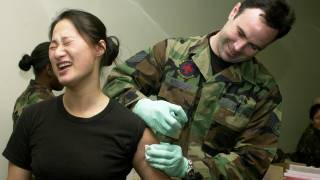Charleston Confirms Mumps Outbreak on Campus

The South Carolina Department of Health and Environmental Control (DHEC) has classified 3 recent cases of Mumps virus as an outbreak in Charleston, SC.
College of Charleston (CoC) health officials and student affairs staff have been working around the clock to provide support to all affected individuals in each of these cases, said a press release published on September 23, 2019.
The 1st mumps case was confirmed at the CoC on September17, 2019.
From January to September 13, 2019, there have been 2,363 US mumps infections reported this year.
The CoC said it is notifying classmates, roommates, friends, colleagues, and others who may have come into contact with the individuals who tested positive.
The College said it ‘will conduct a vaccination clinic on campus this week to provide high-risk individuals with access to the measles, mumps, rubella (MMR) vaccine.
It’s important to note that even people who have previously had 1 or 2-doses of the MMR vaccine can still contract mumps.
>> Private Mumps Test <<
According to new research from the Emory Vaccine Center on September 2nd, the mumps vaccine appears to deliver ‘insufficient immunity’ in college-aged individuals who were vaccinated in their childhood.
These Emory researchers, along with the Centers for Disease Control and Prevention (CDC), said in a press release, there are 2 possible contributing factors impacting the mumps vaccine’s protection.
These factors are:
- The ‘waning’ of the vaccine-induced immunity, and
- The differences between the strain of the mumps virus now circulating and the mumps strain currently contained in the MMR vaccine.
Previously, the CDC's Advisory Committee on Immunization Practices approved the 3rd dose of MMR vaccine for groups of people who are at risk because of an ongoing mumps outbreak.
In addition to isolating the CoC students who tested positive for mumps, College health officials have been verifying student immunization records to identify and contact those who may be at higher risk of contracting the virus.
“Based on the current status of this mumps outbreak, the CDC and DHEC are not recommending that the CoC remove students from campus to prevent further mumps cases,” said College of Charleston spokesman Ron Menchaca.
“Even vaccinated students can become infected with mumps, so the exclusion may not be effective in preventing additional cases.”
In South Carolina, state regulations allow for colleges and universities to set their own policies for immunization requirements. The College has an established pre-matriculation immunization policy that is consistent with the recommendations of the American College Health Association (ACHA) and the Advisory Committee on Immunization Practices (ACIP).
College students can be granted an immunization waiver based on medical or religious reasons.
But in the event of certain communicable disease emergencies, these exempted individuals can be excluded from campus activities in order to protect the health and welfare of the campus community.
In addition to the CoC mumps outbreak, Elon (1) and High-Point Universities (4) in North Carolina have reported recent mumps cases on campus
Mumps is a contagious viral infection spread through saliva or mucus from the mouth, nose, or throat, that may result in parotitis, which causes swelling in the cheek and jaw area below the ear.
Other common symptoms include fever, headache, muscle aches, tiredness and loss of appetite, says the CDC.
Mumps can occasionally cause complications including deafness, inflammation of the testicles, brain, tissue covering the brain, ovaries, and breasts.
Recent mumps vaccine news
- 15 Active Mumps Outbreaks Reported at US Immigration Facilities
- Indiana University Mumps Outbreak Reveals Waning MMR Vaccine Protection
- Mumps Love Visiting UK and USA Colleges
In the USA, there are 2 approved mumps vaccines, MMR-II and ProQuad. Vaccine discounts can be found here.
More information about mumps and the MMR vaccine is available on the DHEC website.
Published by Precision Vaccinations
Our Trust Standards: Medical Advisory Committee

























